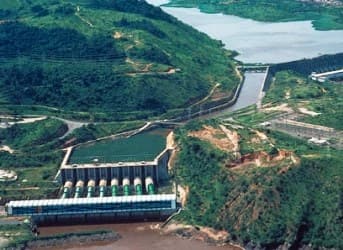Last month Belgium’s Minister for Cooperation and Development Jean-Pascal Labille in the company of Democratic Republic of Congo’s Orientale Province governor Jean Bamanisa opened the rehabilitated Tshopo hydroelectric facility in the provincial capital Kisangani in the northeast of the country. The rehabilitation of the plant on the Tshopo River and its electrical distribution network were jointly financed by Belgium and the DRC. The Belgian contribution to the project was $20 million, while the DRC paid $2.5 million.
Belgium has a long and dolorous history in the country, as in the early 20th century, Belgian forces arrived and brutalized the population as King Leopold ruled the country as his personal fiefdom. But the return of Belgian interests to the DRC represents a small glimmer of Western faith and investment in a country that has seen little but brutal violence for two decades.
The upside is that the DRC, which achieved independence in 1960 and is similar in size to Western Europe, is extremely wealthy in diamonds, gold, copper, cobalt and zinc, among other minerals.
The downside is that everyone wants those resources and is willing to fight to acquire them. In what has been described as “Africa's first world war,” during 1994-2003 the DRC became a massive battleground between indigenous and outside African powers, resulting in a holocaust resulting in more than 5 million dead Congolese, the vast majority massacred in a bloodbath nearly completely overlooked in the foreign press. The chaos left the DRC with hardly any roads or railways, and the country’s health and education systems lying in ruins. Laurent Kabila, installed as president in 1997, renamed the country from Zaire to the Democratic Republic of Congo. Unable to secure his power, Kabila called in help from Zimbabwe, Namibia and Angola, and for the next five years their forces, along with those of Rwanda and Uganda clashed on Congolese territory. All sides were accused of using the cover of the war to loot the country's riches.
Related article: India, China, Among Others Eye Himalaya’s Hydroelectric Potential
With the installation of a transitional government in 2003 after peace accords, economic conditions slowly began to improve as the transitional government reopened relations with international financial institutions and international donors.
But the past decade has seen only the most altruistic international organizations venture there, along with hardy foreign governments – or those with an agenda.
The country is hardly stabilized, though the level of violence has decreased from the genocidal violence of a decade ago.
The downside? Earlier this week, Britain’s Foreign Office staff who had been working in Goma in the DRC were withdrawn following heavy fighting in the area.
Alarmed by the rising violence, the African Union released a statement calling on member states to provide more support to communities affected by violence in the DRC and the Central African Republic (CAR). The AU Peace and Security Council (AUPSC) "appealed to all AU member states to provide assistance to conflict-afflicted civilians in CAR and DRC."
Related article: Supply Policies Prevent Hydropower from Fulfilling its Potential
The latest despoilers of the country’s fragile peace are the March 23 Movement militants battling government authority in the eastern DRC. The DRC government has repeatedly accused Rwanda of backing the M23, which was reportedly initially led by Bosco "Terminator" Ntaganda, who is wanted by the International Criminal Court on war crimes charges. Alarmed by the rising violence, in a first, the U.N. Security Council has authorized its new, 3,000-troop strong United Nations Intervention Brigade in the Democratic Republic of Congo to join Congolese government soldiers in offensive military operations against the rebels. The U.N., which has been trying to stabilize the Congo since 1999, already fields a peacekeeping force of 17,000 U.N. soldiers, funded with an annual budget of $1.35 billion. The new force of more than 3,000 troops, drawn mainly from Tanzania and South Africa, has been in eastern Congo for nearly three months.
The violence and chaos ensures that significant foreign investment in infrastructure projects such as Tshopo will at present regrettably remain few and far between.
For the residents of Kisangani, their immediate concern is gratitude for their former colonial overlords, who at least helped turn the lights back on.
Until the guerrillas return.
But Britain’s Soco International is undeterred, evaluating possible oil reserves in the DRC’s Virunga, which is home to more than 3,000 different animal species, including an estimated 200 endangered mountain gorillas, leaving an appalled WWF-Democratic Republic of Congo (DRC) country director Raymond Lumbuenamo to observe, "Once you turn it into an oil field you sell it once and it's gone for good. It's going to get destroyed, polluted - the beauty of it will go to waste."
Profits over people – the story of Congo’s agony continues.
By. John C.K. Daly of Oilprice.com


















